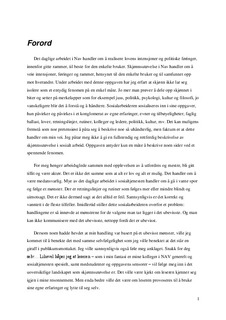| dc.description.abstract | This master’s thesis deals with the topic Professional Discretion in the Social Services. The starting point is the experience that a social security officer is exposed to many and partly contradictory expectations and requirements. The thesis is based on review and analysis of relevant literature. This approach has its basis in the fact that there is a lack of theory on the subject Professional Discretion and I have aimed at gathering available knowledge on the topic.
The problem of the Thesis was formulated as follows: How can one explain the content in the practice of professional discretion of the social security service in a perspective which recognizes that the social security worker shall safeguard different and partly contradictory expectations and requirements?
My scientifically and theoretically approach is hermeneutic. There are two ways to look upon professional discretion which are important to distinguish between. Professional discretion can be looked upon as an epistemic category and as a structural category. Professional discretion as epistemic category is about how one as a social security officer can understand another person and know something about what is good, right or appropriate for him or her. In the paper I point to the fact that this does not have to be described as tacit knowledge, empathy, intuition, or similar, but that professional discretion as epistemic category can be looked upon as a form of practical reasoning. Professional discretion as structural category deals with the laws, guidelines, rules, procedures etc. that govern the professional discretion of the social security officer, and I have discussed the influence of these limits on the professional discretion of the social security officer.
My findings show that:
Professional discretion shall preserve what is fair and good in the situation. One may say that the task of the professional discretion is to argue humanity into the system, at the same time as it is connected to policy, laws, rules and guidelines.Professional discretion has a place in situations where one is facing several equally good optional actions.Professional discretion must be allowed space. If one is too tightly connected (personally or the workplace) to the standards one may lose the space available which the professional discretion shall move in.What is certain or obvious shall not be made uncertain to include the professional discretion.Judgment, consideration and professional discretion are unlike but act together.The practicing of professional discretion is a form of practical reasoning with weak normative clues. Assessments without normative clues are however not professional discretion but feeling.
The title of the thesis, "A Room for Thinking", refers to what I consider to be a very significant discovery: Distance to guidelines and rules, gives a necessary room for thoughts and considerations both for oneself and for the other. One should be connected to one’s knowledge but if the professional discretion shall function one must at the same time have a certain distance to the guidelines, standards and rules which is represented by one’s knowledge. A meeting between people is about giving space for both parties to express oneself and present their considerations. If one is more occupied with arguing one’s own views than with understanding the other, that is an expression of the fact that one has conquered the standards. In that way one may achieve security but the consequence is that the professional discretion becomes homeless. | nb_NO |
